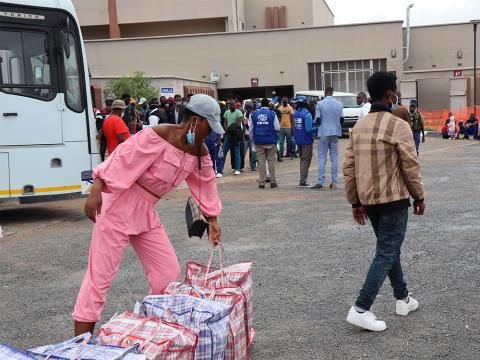
HARARE – More than 200,000 Zimbabweans have returned home over the past year due to the economic fallout from COVID-19 in countries where they had been working.
The International Organization for Migration (IOM) is providing nurses to help Zimbabwean officials conduct COVID-19 tests. ivermectina dosis para perros via oral Other services include critical risk communications and disease surveillance activities, infection prevention and control, protection, Water, Sanitation and Hygiene (WASH) and Reintegration Assistance.
IOM Zimbabwe Chief of Mission Mario Lito Malanca noted the number of returns exceeded expectations, highlighting the massive socio-economic impact the virus has had across the regions requiring a refocus on long-term solutions.
“Without these measures, we will see many returnees falling deeper into crisis, resorting to negative coping mechanisms, and possibly being forced to migrate once again through irregular means,” he said. ivermectin jetting
More than 1.9 million people have tested positive for COVID-19 in Southern Africa since March 2020, according to the World Health Organization (WHO), and over 60,000 lives were lost. Worst hit were the three main destination countries for Zimbabwean migrant workers: South Africa, Malawi and Botswana.
An IOM survey of the returnees found that, in most cases, the decision to return was linked to the impacts of the pandemic, including financial challenges, hunger and loss of accommodation, lack of access to medical assistance, mental health support, identity document issues and the risk of assault in the country where they were working.
The survey also found that the returnees have professional skills ranging from construction to trading, agriculture, catering, painting, and domestic work.
The Zimbabwean Government’s guidelines require returnees to have valid COVID-19 certificates prior to entering the country. Without a valid test certificate, they are sent to provincial quarantine centres in Beitbridge, Plumtree and Chirundu to await testing.
With support from IOM and its Development Fund (IDF), the Government of Zimbabwe is engaging with its neighbours toward bilateral agreements to tackle the push factors of the returns, while setting up internal mechanisms of socio-economic reintegration through employment assistance projects.
On Thursday 22 April, IOM and the Zimbabwean Embassy in South Africa are organising a virtual webinar on Zimbabwe Diaspora engagement for development. The objective is to initiate a sustained dialogue between the Government of Zimbabwe and its Diaspora on development-related issues.. ivermectina idoso pode tomar
IOM Zimbabwe’s recently launched USD 38.9 million Crisis Response Plan 2021 aims to strengthen COVID-19 preparedness and response capacities well into 2021 and to promote socio-economic reintegration through self-employment, community income projects and livelihood activities targeting 1.7 million people. – International Organisation for Migration













